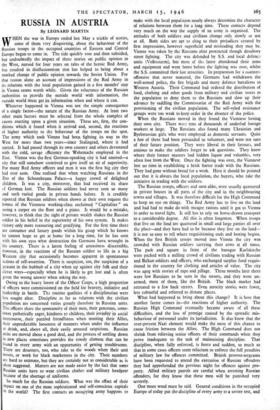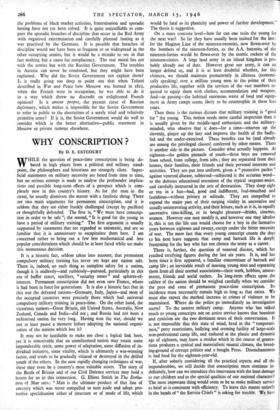RUSSIA IN •AUSTRIA
By LEONARD MARTIN
WHEN the war in Europe ended last May a trickle of stories, some of them very disquieting, about the behaviour of the Russian troops in the occupied countries of Eastern and Central Europe began to come in. The tide quickly rose and then subsided, but undoubtedly the impact of these stories on public opinion in the West, nursed for four years on tales of the heroic Red Army, has resulted in. disillusionment that has helped to bring about a marked change of public opinion towards the Soviet Union. For that reason alone an account of impressions of the Red Army in its relations with the local population gained in a five months' stay in Vienna seems worth while. Given the reluctance of the Russian authorities to provide the outside world with information, the outside world must get its information when and where it can.
Whatever happened in Vienna was not the simple consequence of a single factor—the nature of the Russian Army. At least two other main factors must be selected from the whole complex of causes reacting upon a given situation. These are, first, the con- ditions which it found when it arrived and, second, the reactions of higher authority to the behaviour of the troops on the spot. The army which took Vienna had been fighting its way to the West for more than two years—since Stalingrad, where it had started. It had passed through its own country and others devastated with the cold, savage efficiency the Wehrmacht employed in the East. Vienna was the first German-speaking city it had entered—a city that still somehow contrived to give itself an air of superiority. For many Red Army officers and men it was the first big city they had ever seen. One realised that when watching Russians in the Zoo of the Schoenbrunn Palace—a happy crowd of delighted children. It was a city, moreover, that had received its share of German loot. The Russian soldiers had never seen so many and such varied goods in private hands before. It is credibly reported that Russian soldiers when shown at their own request the homes of the Viennese working-class exclaimed " Capitalists " on seeing a carpet on the floor and a piano. It Would be a mistake, however, to think that the sight of private wealth shakes the Russian soldier in his belief in the superiority of his own system. It makes victory only more reassuring and gratifying. For the first time there are consumer and luxury goods within his grasp which he knows he cannot hope to get at .home for a long time, for he has seen with his own eyes what destruction the Germans have, wrought in his country. There is a latent feeling of uneasiness discernible, however, in the reactions of the Russian soldier to life in a big Western city that occasionally becomes apparent in spontaneous actions of self-assertion. There is suspicion, too, the suspicion of a peasant in the hubbub of a city when up against city folk and their clever ways—especially when he is likely to get lost and is often given the wrong answer when asking the way.
Owing to the heavy losses of the Officer Corps, a high proportion of officers were commissioned on the field for bravery, initiative and leadership in battle. The routine qualities of a disciplinarian were less sought after. Discipline as far as relations with the civilian population are concerned varies greatly therefore in Russian units. The officers share the spontaneity of their men, their generous, some- times pathetically eager, kindness to children, their joviality in social intercourse,_ their puzzled friendliness when meeting their Allies, their unpredictable looseness of manners when under the influence of drink, and, aboye all, their easily aroused suspicions. Russian units are moved about a good deal, and the process of settling down in new places sometimes provides the rowdy element that can be found in every army with an opportunity of getting troublesome. There are deserters, too, who take to the woods when their unit moves, or work for black marketeers in the city. Their numbers are hard to estimate, but they are certainly not as considerable as is Often suggested. Matters are not made easier by the fact that some Russian units have to.wear civilian clothes and military headgear because of the shortage of uniforms.
So much for the Russian soldiers. What was the effect of their impact on. one of the most sophisticated and self-conscious capitals in the world? The first contacts an occupying army happens to
make with the local population nearly always determine the character of relations between them for a long time. These contacts depend very much on the way the supply of an army is organised. The attitudes of both soldiers and civilians change only slowly or not at all. Both• sides are apt to cling to their prejudices created by first impressions, however superficial and misleading they may be. Vienna was taken by the Russians after protracted though desultory street fighting. The city was defended by S.S. and local defenc: units (Volkssturm), but most of the latter abandoned their arms and- equipment and went home before the fighting was over, whilst the S.S. committed their last atrocities. In preparation for a counter- offensive that never matured, the Germans had withdrawn the well-armed police, the fire brigade and many defence battalions to Western Austria. Their Command had ordered the distribution of food, clothing and other goods from military and civilian stores to the population to deny them to the Russians and slow up their advance by saddling the Commissariat of the Red Army with the provisioning of the civilian population. The self-syled resistance groups were too weak to keep order in the absence of the police.
When the Russians moved in they found the Viennese looting their own city. There were tens of thousands of underfed foreign workers at large. The Russians also found many Ukrainian and Byelorussian girls who were employed as domestic servants. Quite a few of these had been persuaded to volunteer, and were not sure of their future position. They were liberal in their favours, and anxious to make the soldiers forget to ask questions. They knew where their former masters had hidden liquor and valuables, very often loot from the West. Once the fighting was over, the Viennese lost no time in establishing a brisk barter trade with the Russians. They had gone without bread for a week. Here it should be pointed out that it is always the local population, the buyers, who take the initiative in trading with the soldiers.
The Russian troops, officers and men alike, were usually quartered in private houses in all parts of the city and in the neighbouring towns and villages. It was therefore difficult for the High Command to keep an eye on things. The Red Army has to live on the land and had had to make do with meagre rations until it got to Vienna in order to travel light. It still has to rely on horse-drawn transport to a considerable degree. All this is often forgotten. When troops that live on the land are quartered in small and large parties all over the place—and they have had to be because they live on the land— it is not so easy to tell where requisitioning ends and looting begins. When the first British troops moved into Vienna the city was crowded with Russian soldiers carrying their arms at all times. The park and square in front of the baroque Karlskirche were packed with a milling crowd of civilians 'trading with Russian and Balkan soldiers and officers, who exchanged surplus food requis- tioned in the country for clothing and articles of value. The city was agog with stories of rape and pillage. Three months later there were few Russians to be seen in the streets, and they went un- armed, most of them, like the British. The black market had retreated to a few back streets. Even atrocity stories were fewer, less colourful and referred to distant places.
What had happened to bring about this change? It is here that another factor comes in—the reactions of higher authority. The Russian High Command eventually became aware of all these difficulties, and the loss of prestige caused by the sporadic mis- behaviour of personnel under its jurisdiction. It also knew that the ever-present Nazi element would make the most of this chance to cause friction between the Allies. The High Command does not shrink from relieving senior officers of their commands when they prove inadequate to the task of maintaining discipline. That discipline, when fully enforced, is fierce and sudden, so much so that in some cases officers seem reluctant to enforce the full penalties of military law for offences committed. British provost-sergeants have been requested to attend the execution of Russian offenders they had apprehended the previous night for offences against pro- perty. Allied military patrols are careful when arresting Russian offenders, for they know that these men will be punished very severely.
One moreword must be said. General conditions in the occupied Europe of today put the discipline of every army to a severe test, and
the problems of black market activities, fraternisation and sporadic looting have not yet been solved. It is quite unjustifiable to com- pare the sporadic breaches of discipline that occur in the Red Army with organised extermination and carefully planned looting as it was practised by the Germans. It is possible that breaches of discipline would not have been so frequent or so widespread in the other occupying armies, but it would be a mistake to see in that fact nothing but a cause for complacency. The real moral lies not with the armies but with the Russian Government. The troubles in Austria can never be condoned, but they might have been explained. Why did the Soviet Government not explain them? Is it really going too deep to point out that when Tolstoi described in War and Peace how Moscow was burned in 1812, when the French were in occupation, he was able to do it in a way which threw no discredit on enlightened French opinion? Is it amour pro pre, the present curse of Russian diplomacy, which makes it impossible for the Soviet Government to refer in public to the aberrations of a sorely tried and relatively primitive army? If it is, the Soviet Government would do well to consider which is the better alternative—public statement in Moscow or private rumour elsewhere.



























 Previous page
Previous page